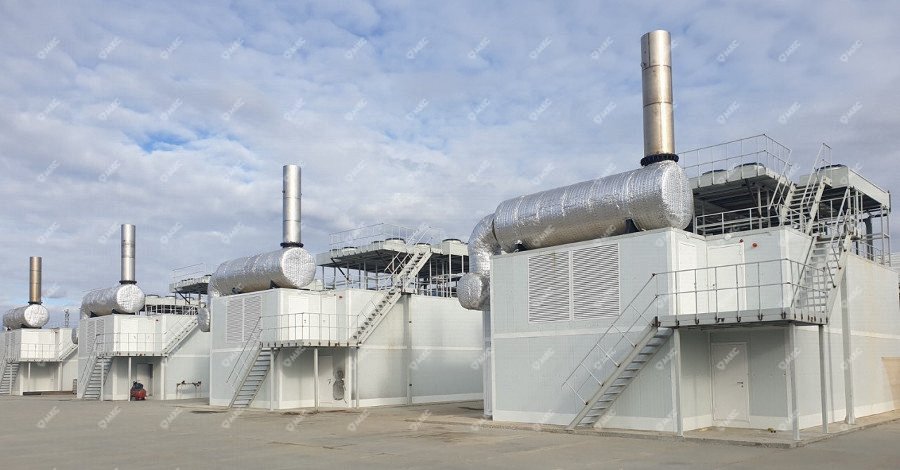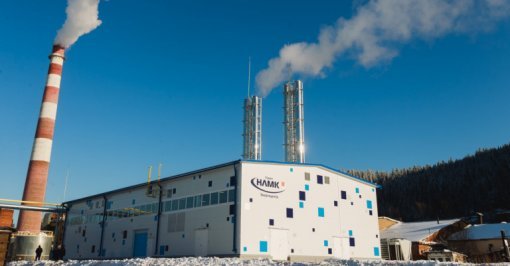Mini-thermal power plant. What is it?
Table of contents
A mini-CHP (small thermal power plant) is a compact autonomous power plant that produces combined heat and electricity with a capacity of up to 25 MW and is in close proximity to the end user. It can operate both in "island" mode, when there is no external power supply at the site, and in parallel with the main grid.
Modern mini-CHPs operate mainly based on gas piston units (abbreviated as GPU), which generate electricity by utilizing a reciprocating internal combustion engine and an alternator. The energy source in a mini-CHP can also be a gas turbine, steam, or hot-water boiler plant. The choice of equipment is determined by the optimal option from the point of view of the volume of investments and the period of realization.
The use of mini-CHP is a modern, reliable, and cost-effective solution to the issue of supplying the facility with electricity and heat, as it ensures consumer independence from centralized power supply systems, solves the problem of shortages and power outages, and allows significant savings on electricity and heating costs.
Areas of mini-CHP application
The use of mini-CHPs is most expedient at facilities remote from the central mains and at enterprises where the production technology stipulates a constant need for heat energy.
Mini-CHPs are installed for food, processing, pharmaceutical and consumer goods manufacturing. Autonomous power centers are ordered to provide technological processes of livestock complexes, poultry farms and meat processing plants.
Here is not nearly a complete list of possible applications of mini-CHPs:
- at manufacturing plants
- in logistics (logistics complexes)
- oil and gas
- housing and utilities
- business centers, industrial parks
- food processing
- agribusinesses
- at mine-mill plants
and others .
Location options for mini-CHPs
Depending on the customer's requirements and the conditions of power plant installation at the enterprise, there are two main types of mini-CHP design:
- Block-modular design - the GPU with all auxiliary equipment and systems is installed inside a fast-erected compact block-type building with modular arrangement of the main equipment (GPU) and auxiliary systems
- Stationary design - the GPU with all auxiliary equipment and systems is installed inside a capital building.
A modular unit reduces the commissioning time and the cost of project implementation and has no space limitations. The modular unit may be dismantled, transferred, erected, and put into operation within a few weeks.
Example of block-module mini-CHP produced by MKS Group:


Fuel for mini-CHP
Mini-CHPs operate on various types of combustible gaseous fuels. The most common and efficient type of fuel is natural gas.
Other possible types of gaseous fuels:
- landfill gas;
- biogas;
- associated petroleum gas;
- mine gas;
- purification gas;
- coal mine gas;
- coke oven gas;
- liquid gas (propane, LNG), etc.
When using alternative gaseous fuels, it is necessary to analyze the gas beforehand, check the gas composition and parameters for compliance with the manufacturer's requirements.
Construction of a mini-CHP plant
The following diagram shows a flowchart of the turnkey construction of a mini-CHP by one of the leaders of the small-scale distributed power generation industry in Russia - MKS Group.

Each stage of this technological chain is very important, impossible without the others and requires the highest competence of performers. If all the work is done by one turnkey company, obviously the final cost of such an object will be lower than if each stage was performed by different contractors. Also, a single contractor will control the quality of work at each stage, which cannot be said about several contractors, where each is responsible only for his specific volume, and not for the project.
Advantages of a mini-CHP plant
The main advantages of mini-CHP compared to standard power supply schemes include:
- low cost of generated electricity and heat and, accordingly, fast return on investment;
- increasing the reliability of energy supply;
- independence of the consumer's operating mode from the operating mode of power systems.
Experts have calculated that by using mini-CHPs, the cost of heat and power supply can be reduced by 3-4 times, while the payback period will be only 3-5 years.
The MKS Group is a leading engineering company in Russia, the main activity of which is the construction of small–scale energy facilities - turnkey gas piston power plants.
Over 15 years, it has commissioned 53 mini-CHPs in various regions and abroad.
The total capacity of all commissioned facilities of the MKS Group was 244 MW.
The MKS Group is the official Russian dealer and service partner of MWM Austria GmbH.
© MKC Group of Companies LLC, 2020
 ru
ru en
en



